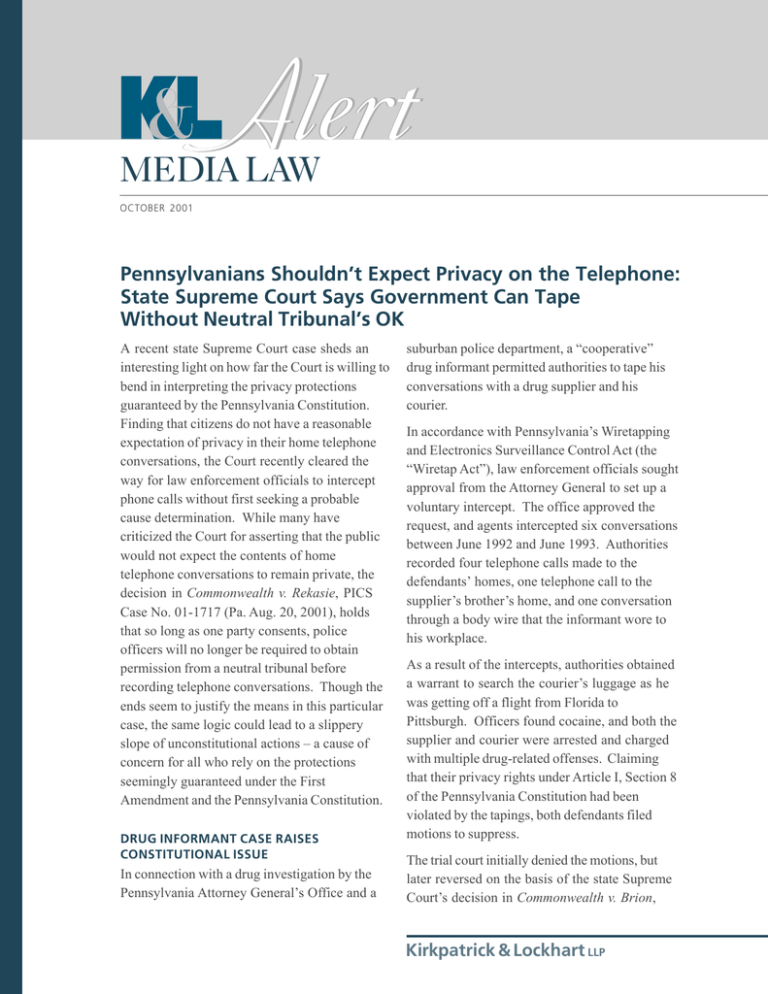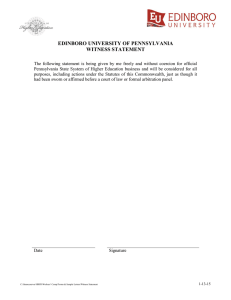
A lert
MEDIA LAW
OCTOBER 2001
Pennsylvanians Shouldn’t Expect Privacy on the Telephone:
State Supreme Court Says Government Can Tape
Without Neutral Tribunal’s OK
A recent state Supreme Court case sheds an
interesting light on how far the Court is willing to
bend in interpreting the privacy protections
guaranteed by the Pennsylvania Constitution.
Finding that citizens do not have a reasonable
expectation of privacy in their home telephone
conversations, the Court recently cleared the
way for law enforcement officials to intercept
phone calls without first seeking a probable
cause determination. While many have
criticized the Court for asserting that the public
would not expect the contents of home
telephone conversations to remain private, the
decision in Commonwealth v. Rekasie, PICS
Case No. 01-1717 (Pa. Aug. 20, 2001), holds
that so long as one party consents, police
officers will no longer be required to obtain
permission from a neutral tribunal before
recording telephone conversations. Though the
ends seem to justify the means in this particular
case, the same logic could lead to a slippery
slope of unconstitutional actions – a cause of
concern for all who rely on the protections
seemingly guaranteed under the First
Amendment and the Pennsylvania Constitution.
DRUG INFORMANT CASE RAISES
CONSTITUTIONAL ISSUE
In connection with a drug investigation by the
Pennsylvania Attorney General’s Office and a
suburban police department, a “cooperative”
drug informant permitted authorities to tape his
conversations with a drug supplier and his
courier.
In accordance with Pennsylvania’s Wiretapping
and Electronics Surveillance Control Act (the
“Wiretap Act”), law enforcement officials sought
approval from the Attorney General to set up a
voluntary intercept. The office approved the
request, and agents intercepted six conversations
between June 1992 and June 1993. Authorities
recorded four telephone calls made to the
defendants’ homes, one telephone call to the
supplier’s brother’s home, and one conversation
through a body wire that the informant wore to
his workplace.
As a result of the intercepts, authorities obtained
a warrant to search the courier’s luggage as he
was getting off a flight from Florida to
Pittsburgh. Officers found cocaine, and both the
supplier and courier were arrested and charged
with multiple drug-related offenses. Claiming
that their privacy rights under Article I, Section 8
of the Pennsylvania Constitution had been
violated by the tapings, both defendants filed
motions to suppress.
The trial court initially denied the motions, but
later reversed on the basis of the state Supreme
Court’s decision in Commonwealth v. Brion,
Kirkpatrick & Lockhart LLP
652 A. 2d 287 (Pa. 1994). In Brion, the Court
held that Pennsylvania’s Constitution mandated a
probable cause determination before the
Commonwealth could intercept a face-to-face
conversation through a body wire worn in a
person’s home.
The superior court reversed, holding that Brion
controlled body wires but not telephone
conversations. In addition, the superior court
concluded that Brion did not apply because the
wire was not worn in the defendant’s home.
SUPREME COURT ANALYSIS
While the Wiretap Act requires the
Commonwealth to obtain approval for a
voluntary interception by an individual designated
by the Attorney General or District Attorney, the
Act does not specifically require a probable
cause determination. In certain instances,
however, the Pennsylvania courts have held that
the state constitution provides privacy
protections beyond the scope of the Wiretap
Act. In those cases, the Commonwealth must
obtain a probable cause determination from a
neutral tribunal before intercepting a
conversation. Thus, the Pennsylvania Supreme
Court focused its analysis on whether under
these circumstances, the Pennsylvania
Constitution required approval from a neutral
tribunal before law enforcement officials could
lawfully tape the defendants’ conversations.
First, the Majority considered whether the
courier had a reasonable expectation of privacy
in telephone conversations with the informant.
The Commonwealth had argued that once the
defendant began conversing with the informant,
he lost any expectation that the information
would remain private, and therefore the
government was not required to obtain a
probable cause determination before intercepting
the call.
Noting that Pennsylvania courts have
consistently utilized the standard established by
2
the U.S. Supreme Court in United States v.
Katz, 389 U.S. 347 (1967), the Court looked to
Katz to assess the Commonwealth’s argument.
Under the Katz test, in determining whether a
person has a reasonable expectation of privacy,
a court should consider whether the person has
exhibited an actual expectation of privacy and if
that expectation is “one that society is prepared
to recognize as reasonable.”
The Court concluded that while the courier may
have had an actual expectation of privacy in his
conversations with the informant, society would
not consider that expectation to be reasonable.
As such, the Court found that the Commonwealth
was not required to obtain a probable cause
determination before intercepting the
conversations.
QUESTIONABLE RATIONALE
The Court reasoned that extension telephones
and speakerphones had altered the public’s
expectations of privacy. “A telephone call
received by or placed to another is readily
subject to numerous means of intrusion at the
other end of the call, all without the knowledge
of the individual on the call,” the Majority held.
“Extension telephones and speakerphones
render it impossible for one to objectively and
reasonably expect that he or she will be free
from intrusion. The individual cannot take steps
to ensure that others are excluded from the
call.”
In dismissing the defendants’ arguments, the
Court held that the instant case could be
distinguished from Brion on the basis that faceto-face interchanges occurring in one’s home
differed from telephone calls that could be
intercepted by the “uninvited ear.” The Court
also rejected the argument that the state
Supreme Court’s decision in Commonwealth v.
Melilli, 555 A.2d 1254 (Pa. 1989) required a
different result. In Melilli, the Court recognized
a privacy interest in telephone numbers that had
KIRKPATRICK & LOCKHART LLP MEDIA LAW ALERT
been revealed to a telephone company. The
Court attempted to reconcile its holding by
asserting that Melilli did not suggest a privacy
interest in all telephone activities.
Interestingly, the Court did not dwell on the
language of the Wiretap Act, which in
Pennsylvania generally requires a party
recording a conversation to obtain the consent of
all parties prior to recording. See 18 Pa. C.S.
§5704(4). While Pennsylvania’s Wiretap Act
exacts a stricter standard than the “one-party”
consent exception provided under the federal
wiretap law and the wiretap laws in many states,
the Majority’s conclusion that the public does not
have a reasonable expectation of privacy in
telephone calls seems to obliterate the extra
layer of protection that the statute was
seemingly intended to provide.
VIGOROUS DISSENT
The decision drew two impassioned dissents,
both of which criticized the Majority’s strained
rationale. The dissenters expressed concern that
the Majority’s decision means that the
Pennsylvania Constitution affords no protection
against the government listening to private
telephone conversations. “By holding that we
have no expectation of privacy in the
confidential messages and conversations
transmitted from our telephones, it has placed
the freedom of every citizen into the hands of
enforcement authorities,” one dissenter wrote.
The dissenting justices also argued that the
Majority had misinterpreted Brion. They
asserted that the key factor in Brion was that
the conversation was recorded in a person’s
private residence, rather than that it was
intercepted by a body wire. The dissenters also
asserted that the decision could not be
reconciled with Melilli, as it is difficult to
imagine how people can expect privacy in the
numbers that they dial, but not in the content of
their conversations.
IMPLICATIONS FOR THE PRESS
While the Rekasie decision does not directly
affect the newsgathering process, it raises a host
of issues surrounding expectations of privacy in
the age of wireless technology. While most
people indeed expect privacy when holding a
telephone conversation within the sanctity of
their own homes, the same cannot be said for
conversations conducted on cellular and portable
phones in public places. Both physics and nosy
third parties seem to justify a lower expectation
of privacy in such instances, and perhaps the
law’s previous efforts to prevent eavesdropping
when there is no rational reason to expect
privacy is unwarranted and ripe for change. On
the flip side, because the media relies on the
state constitution to protect the newsgathering
and writing processes, it is troubling to note that
the Court was willing to disregard seemingly
unassailable privacy provisions. The same sort
of logic could lead to troubling results in different
circumstances.
DAVID G. KLABER
412.355.6498
dklaber@kl.com
David G. Klaber, a partner in the Pittsburgh office, has a
broad civil litigation and commercial arbitration practice,
with particular emphasis in products liability, construction,
commercial contracts and defamation. His defamation experience includes representation of members of the print
media.
HOLLEE SCHWARTZ TEMPLE
412.355.6339
htemple@kl.com
Hollee Schwartz Temple is a litigation associate in the
Pittsburgh office. She received her bachelor’s and master’s
degrees from Northwestern University’s Medill School
of Journalism.
.........................................................................................................................................................
This publication/newsletter is for informational purposes and does not contain or convey legal advice. The information herein
should not be used or relied upon in regard to any particular facts or circumstances without first consulting with a lawyer.
© 2001 KIRKPATRICK & LOCKHART LLP. ALL RIGHTS RESERVED.
OCTOBER 2001
Kirkpatrick & Lockhart LLP
75 State Street
Boston, Massachusetts 02109
617.261.3100 PHONE
617.261.3175 FAX
3100 Bank One Center
1717 Main Street
Dallas, Texas 75201
214.939.4900 PHONE
214.939.4949 FAX
Payne Shoemaker Building
240 North Third Street
Harrisburg, Pennsylvania 17101
717.231.4500 PHONE
717.231.4501 FAXFAX
10100 Santa Monica Boulevard
Seventh Floor
Los Angeles, California 90067
310.552.5000 PHONE
310.552.5001 FAX
Miami Center - 20th Floor
201 South Biscayne Boulevard
Miami, Florida 33131
305.539.3300 PHONE
305.358.7095 FAX
The Legal Center
One Riverfront Plaza, Seventh Floor
Newark, New Jersey 07102
973.848.4000 PHONE
973.848.4001 FAX
1251 Avenue of the Americas
45th Floor
New York, New York 10020
212.536.3900 PHONE
212.536.3901 FAX
Henry W. Oliver Building
535 Smithfield Street
Pittsburgh, Pennsylvania 15222
412.355.6500 PHONE
412.355.6501 FAX
Four Embarcadero Center, 10th Floor
San Francisco, California 94111
415.249.1000 PHONE
415.249.1001 FAX
1800 Massachusetts Avenue, N.W.
Second Floor
Washington, DC 20036
202.778.9000 PHONE
202.778.9100 FAX
www.kl.com
Kirkpatrick & Lockhart LLP
Challenge us.





